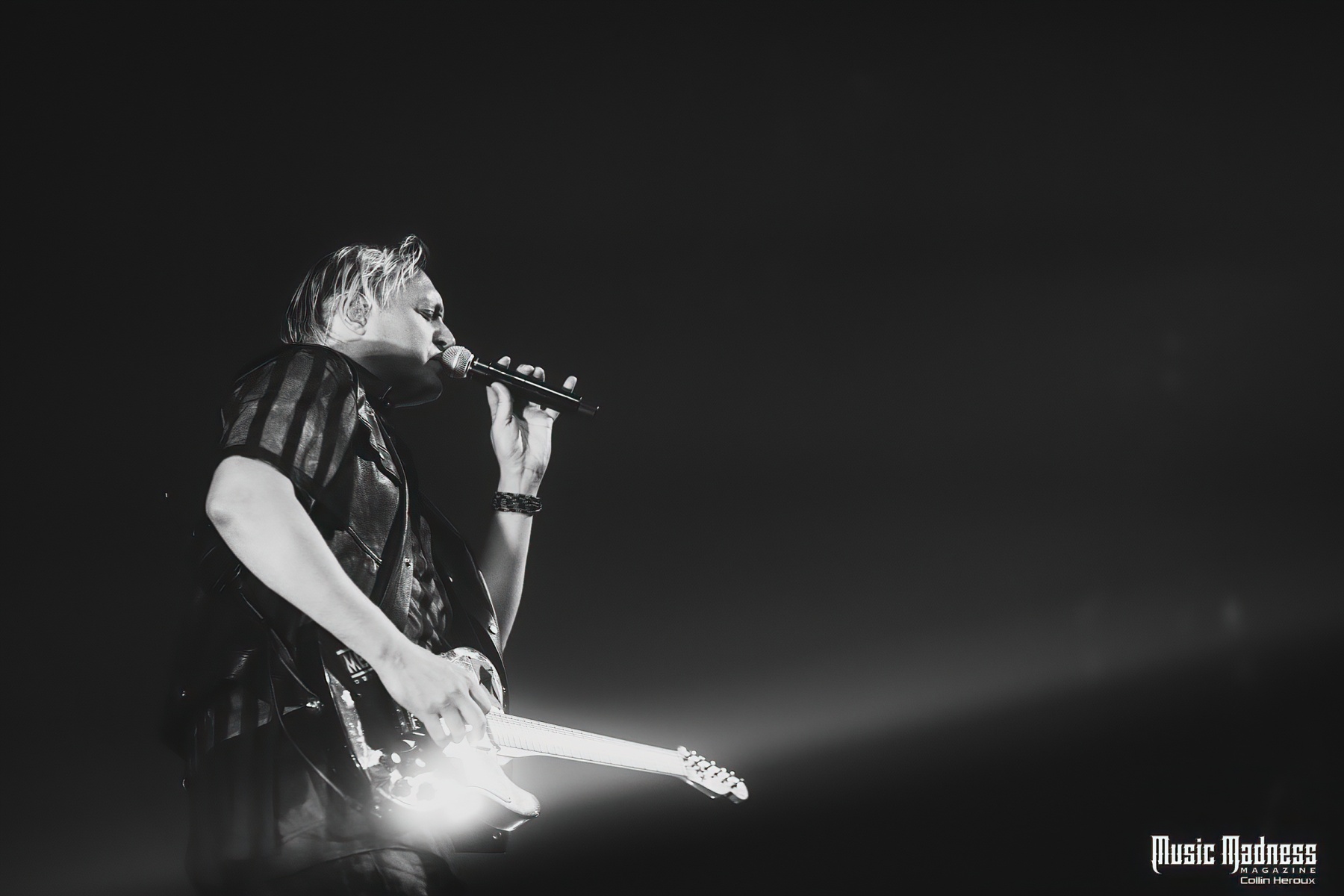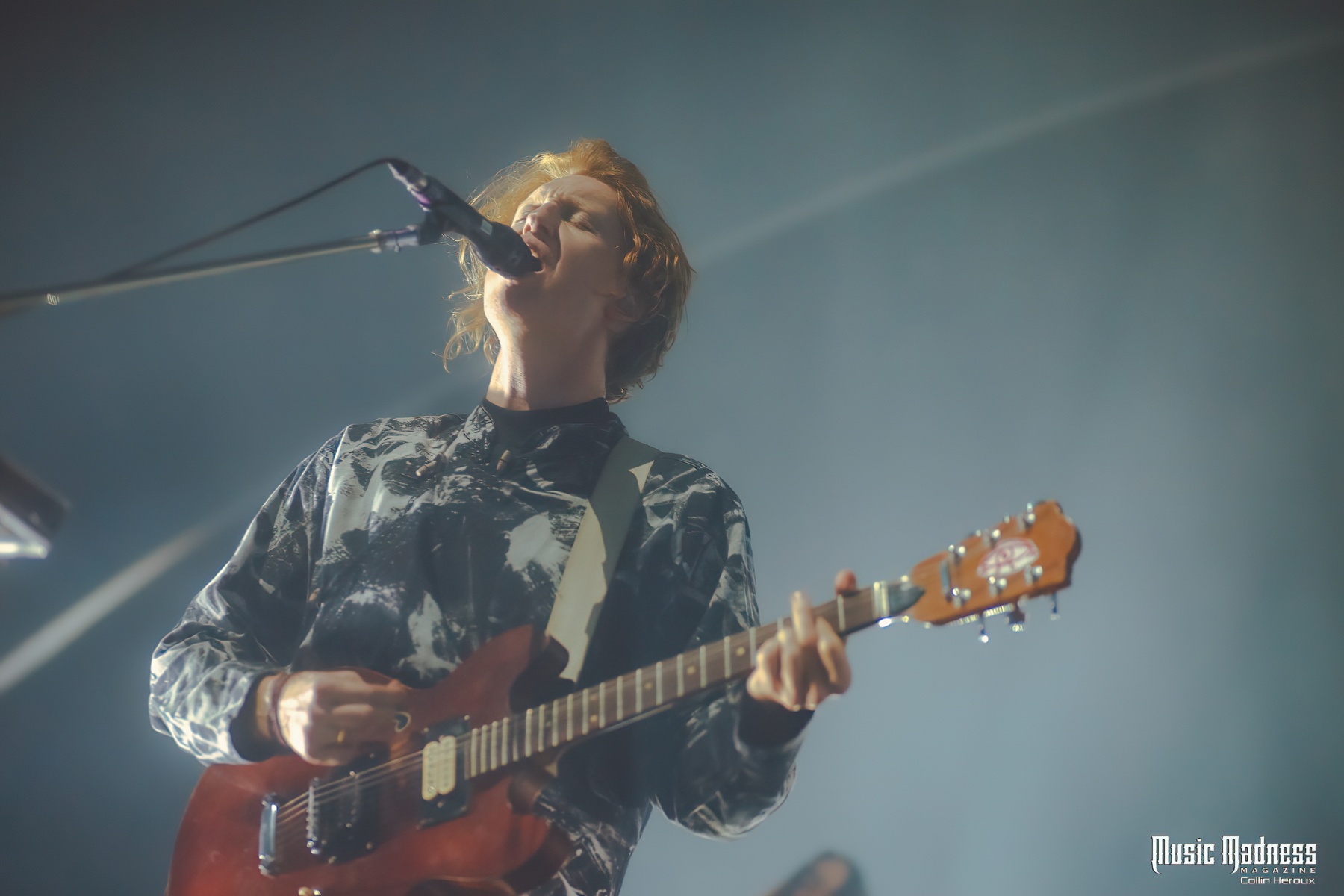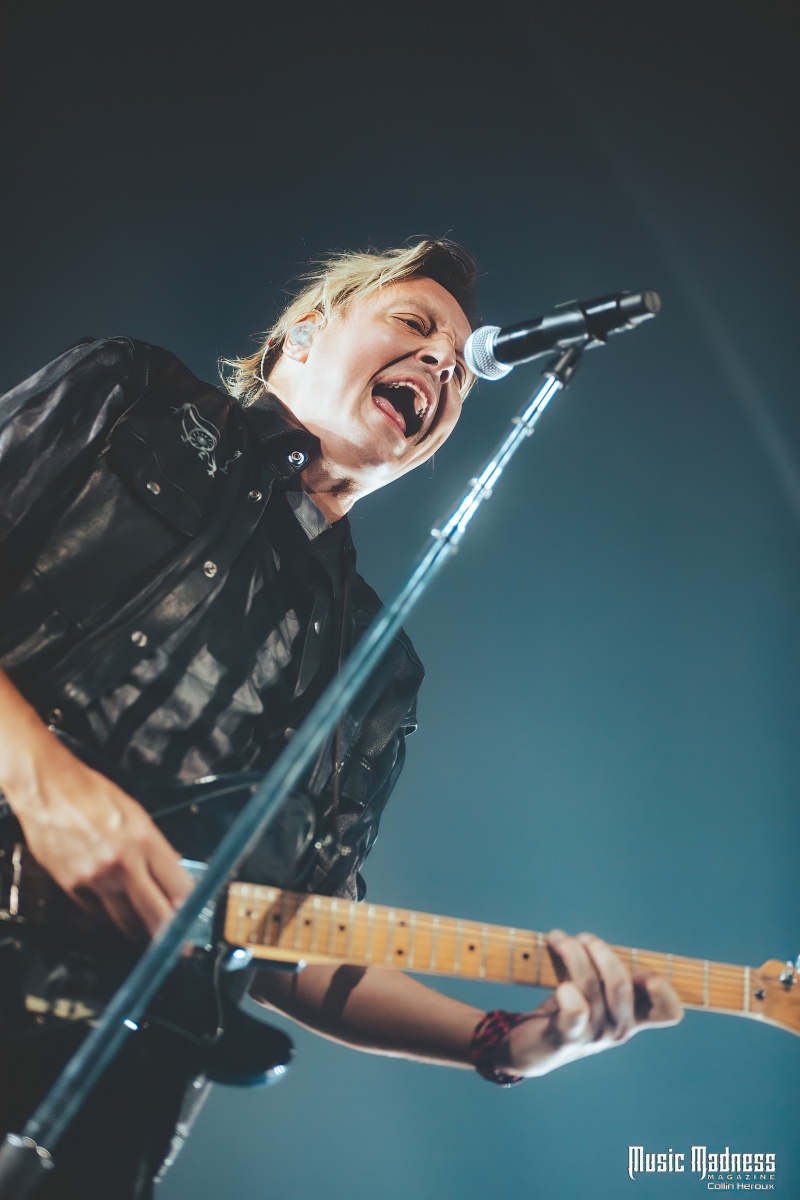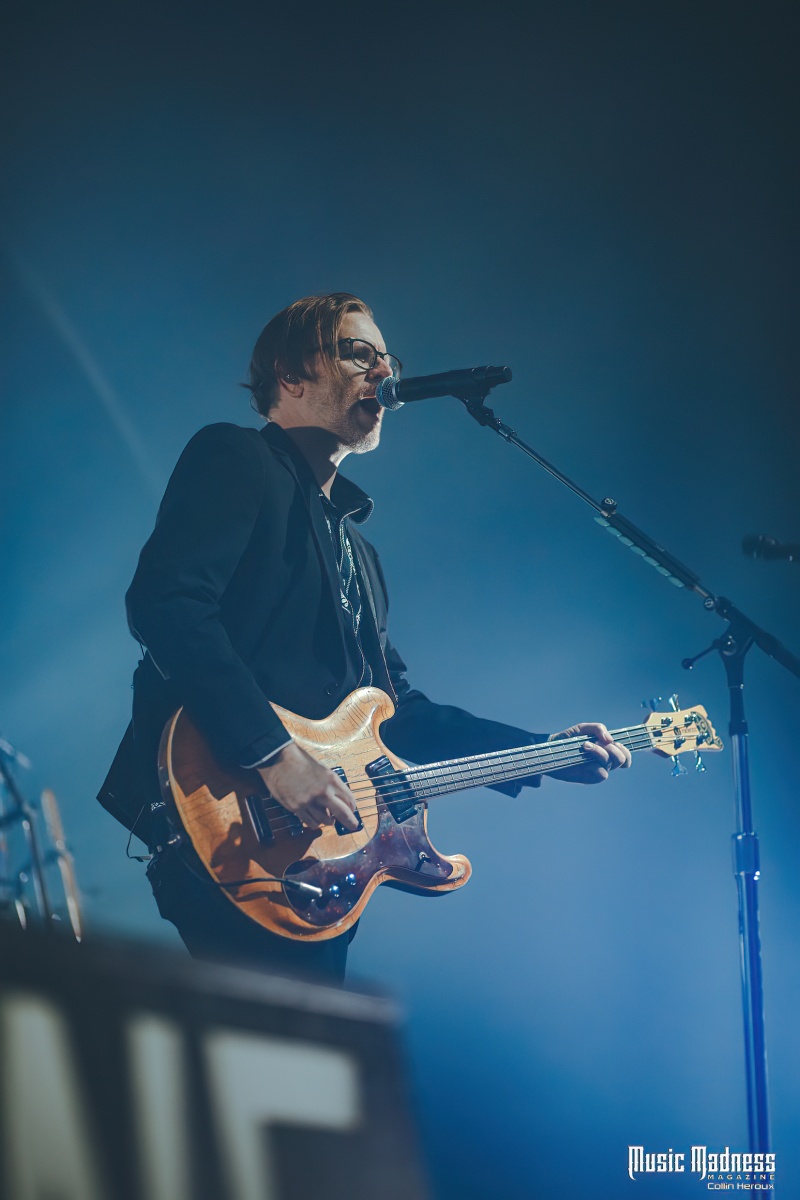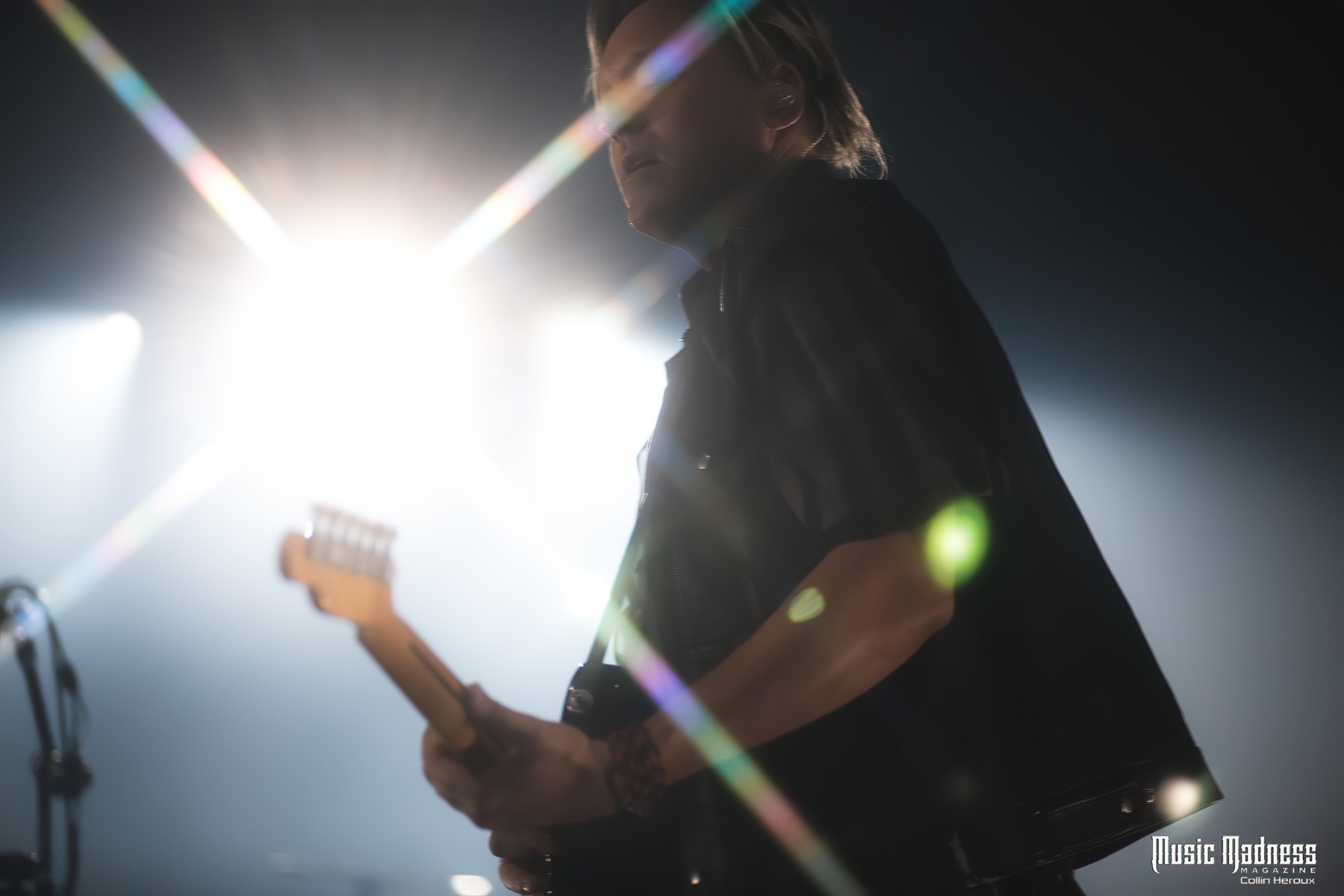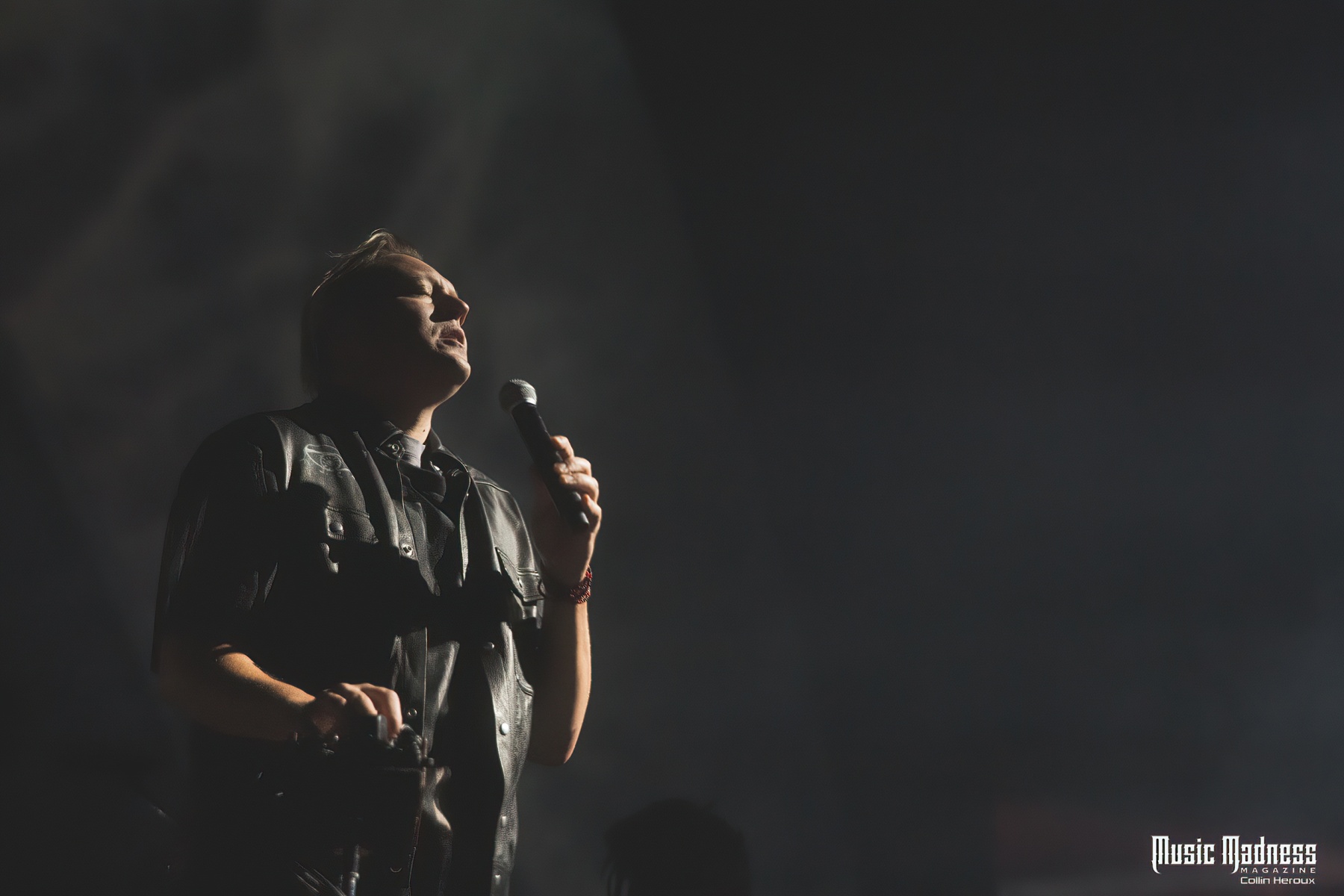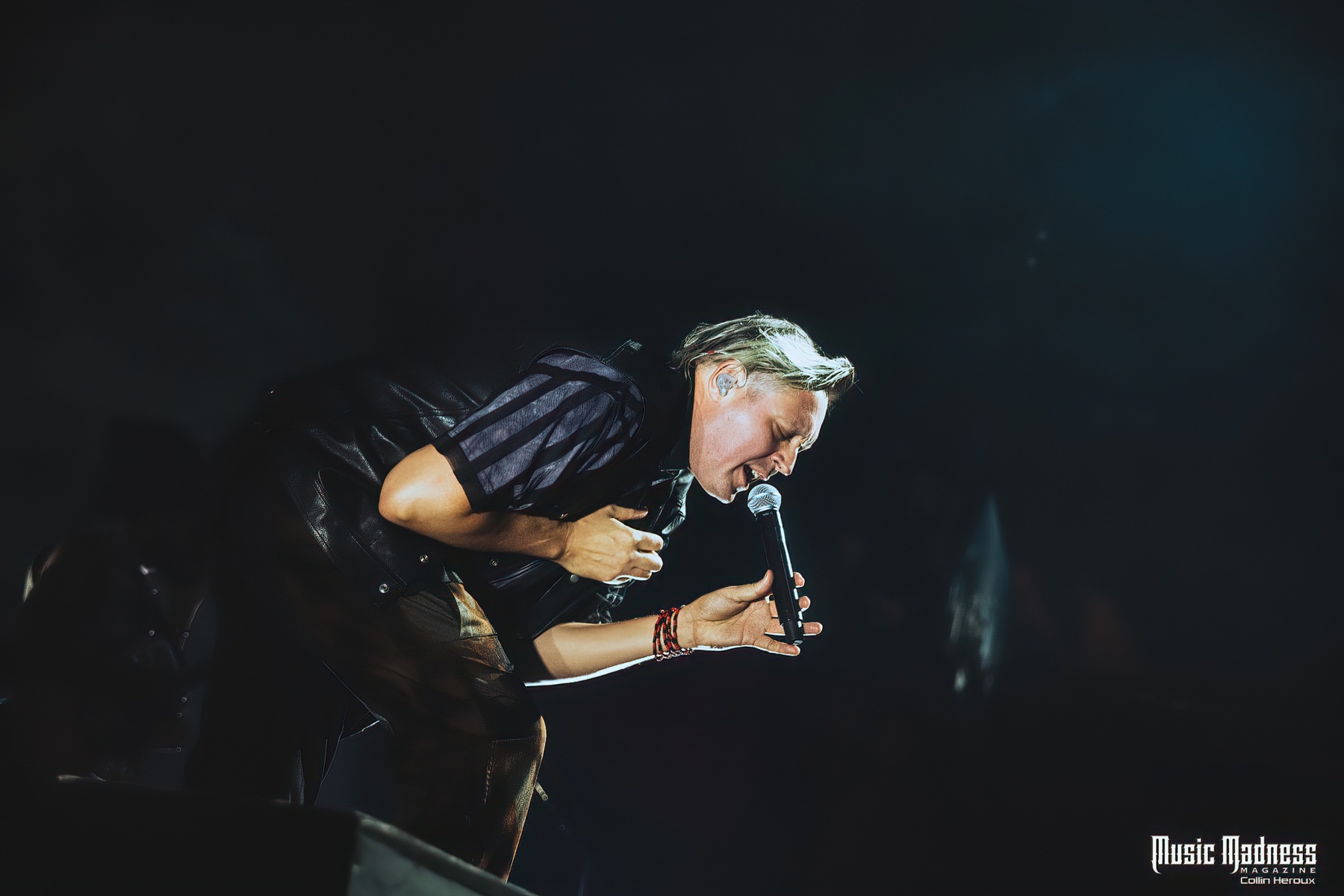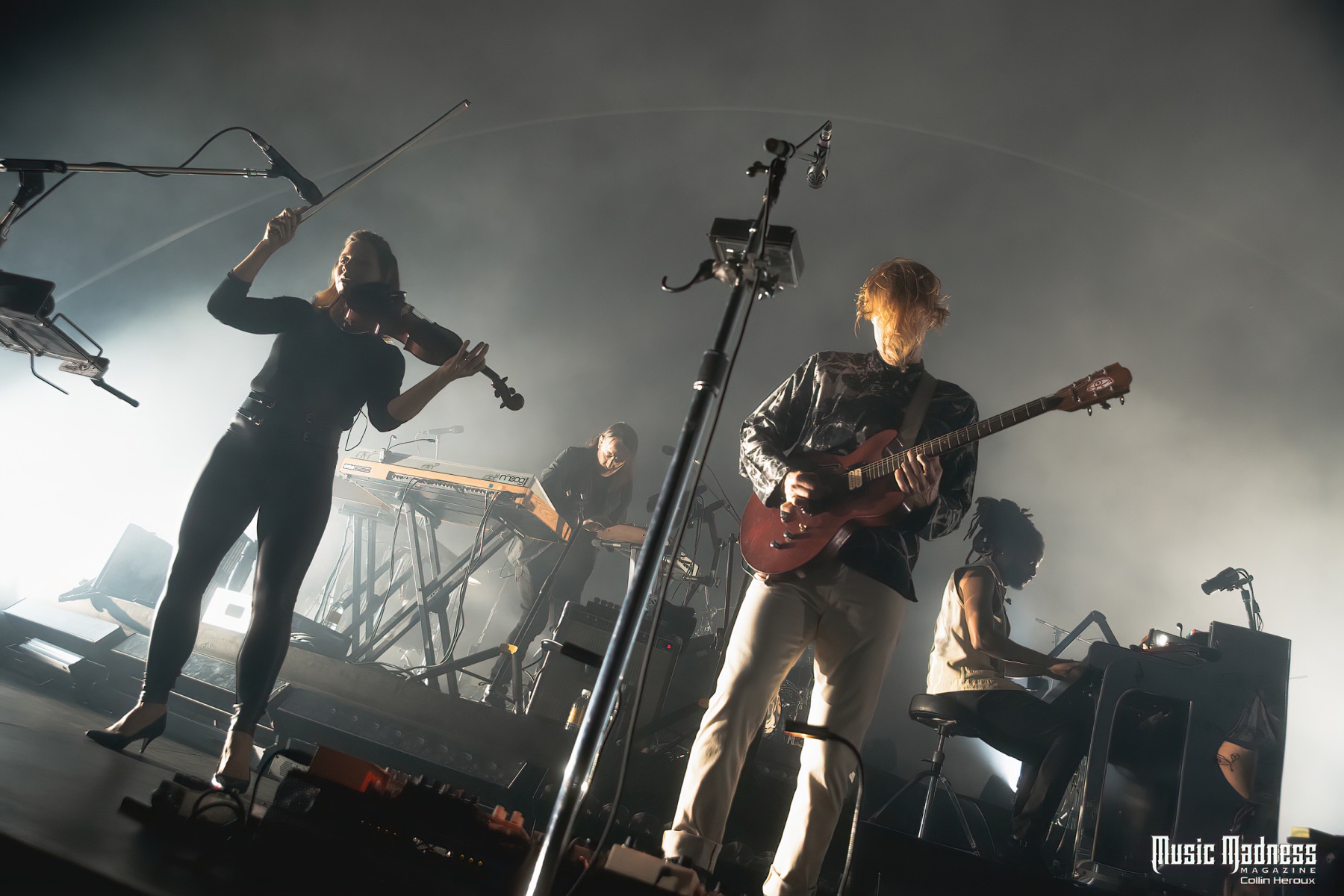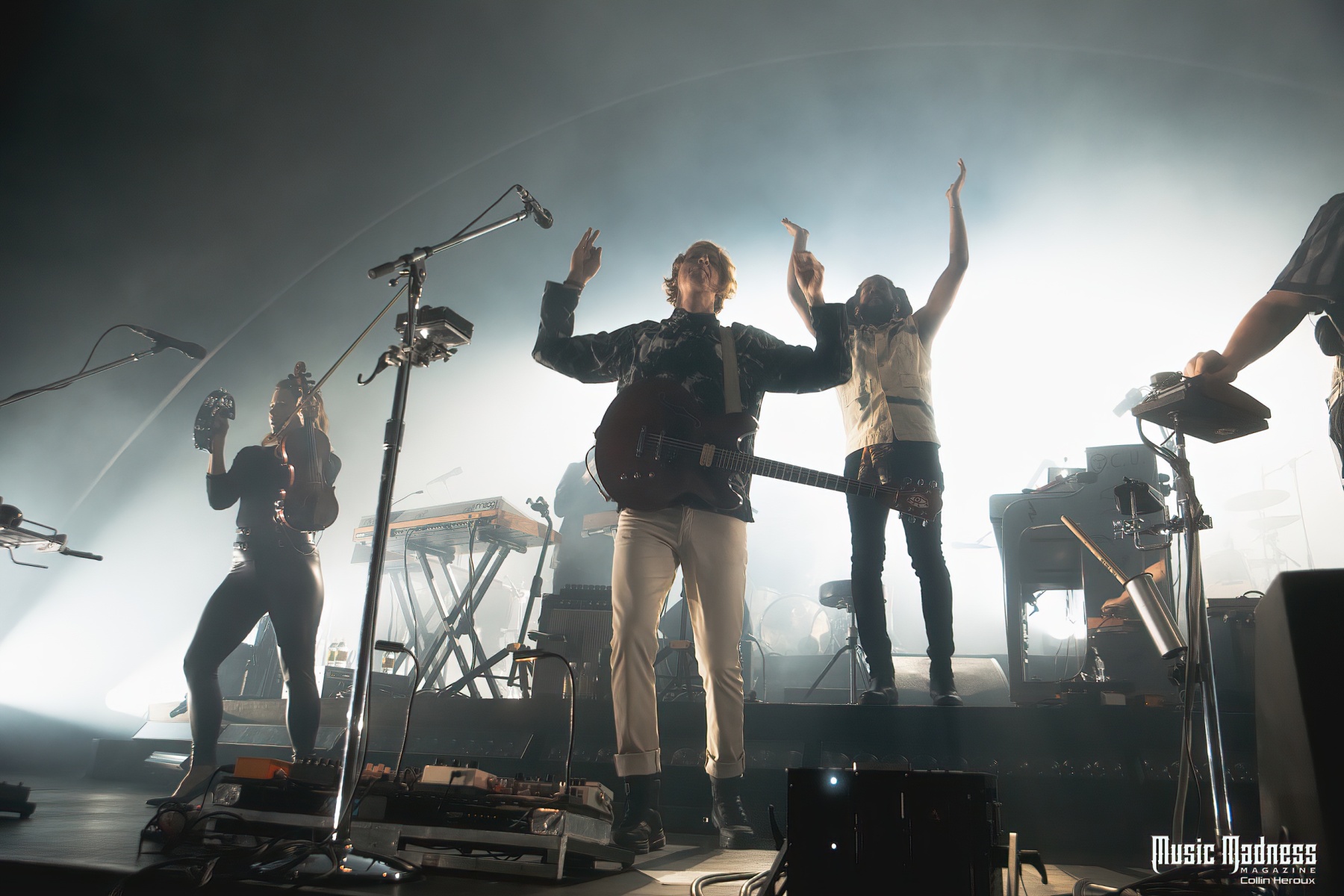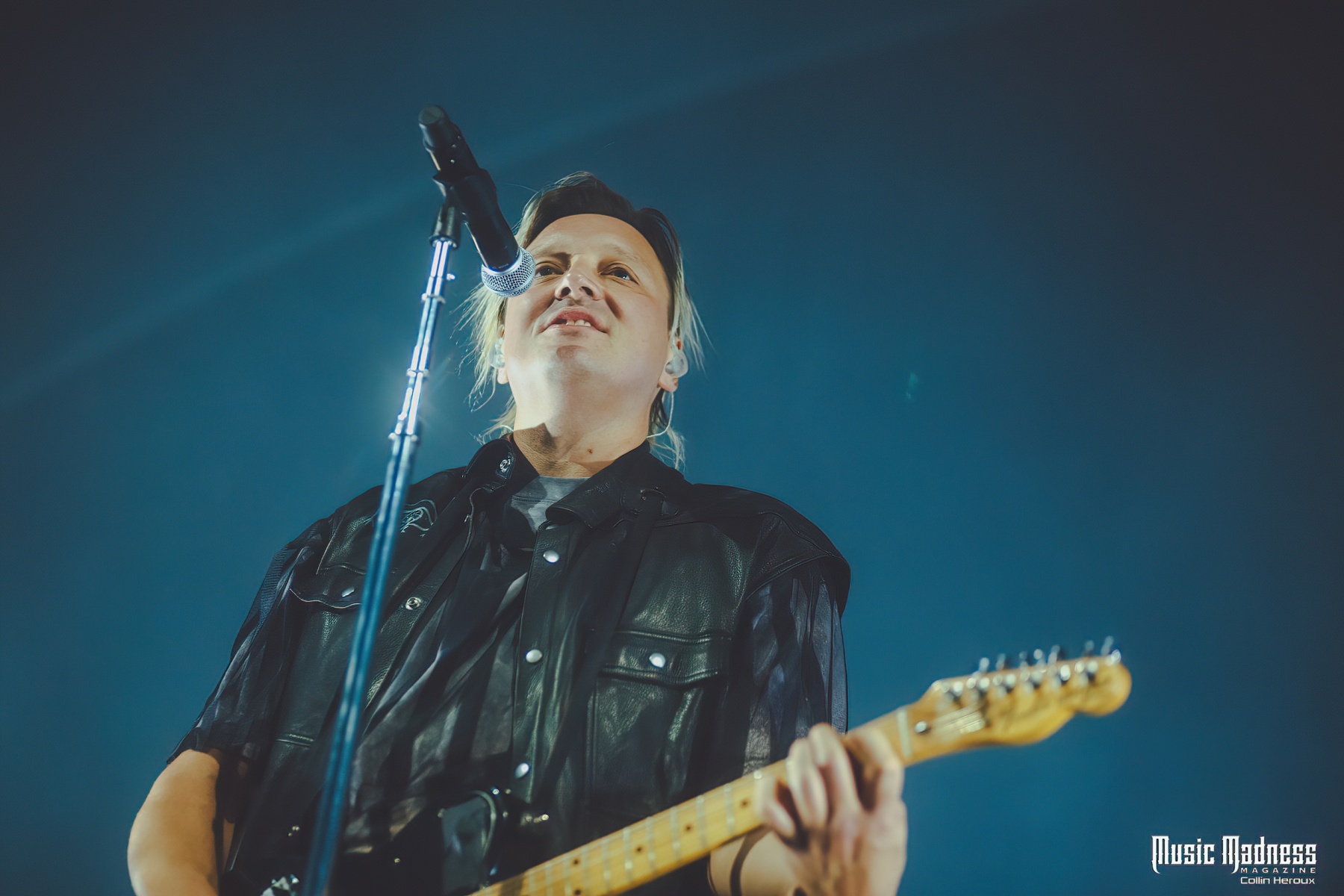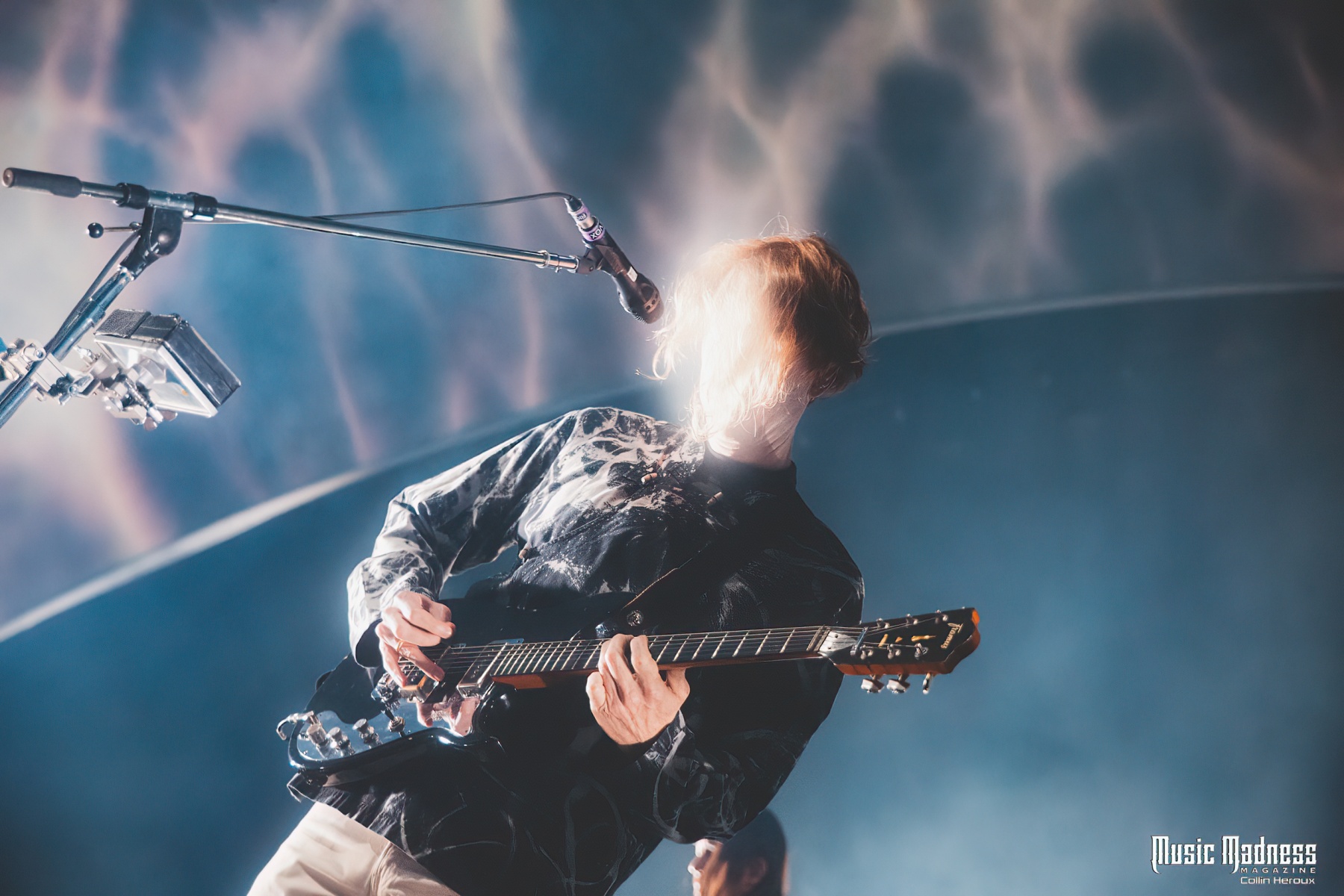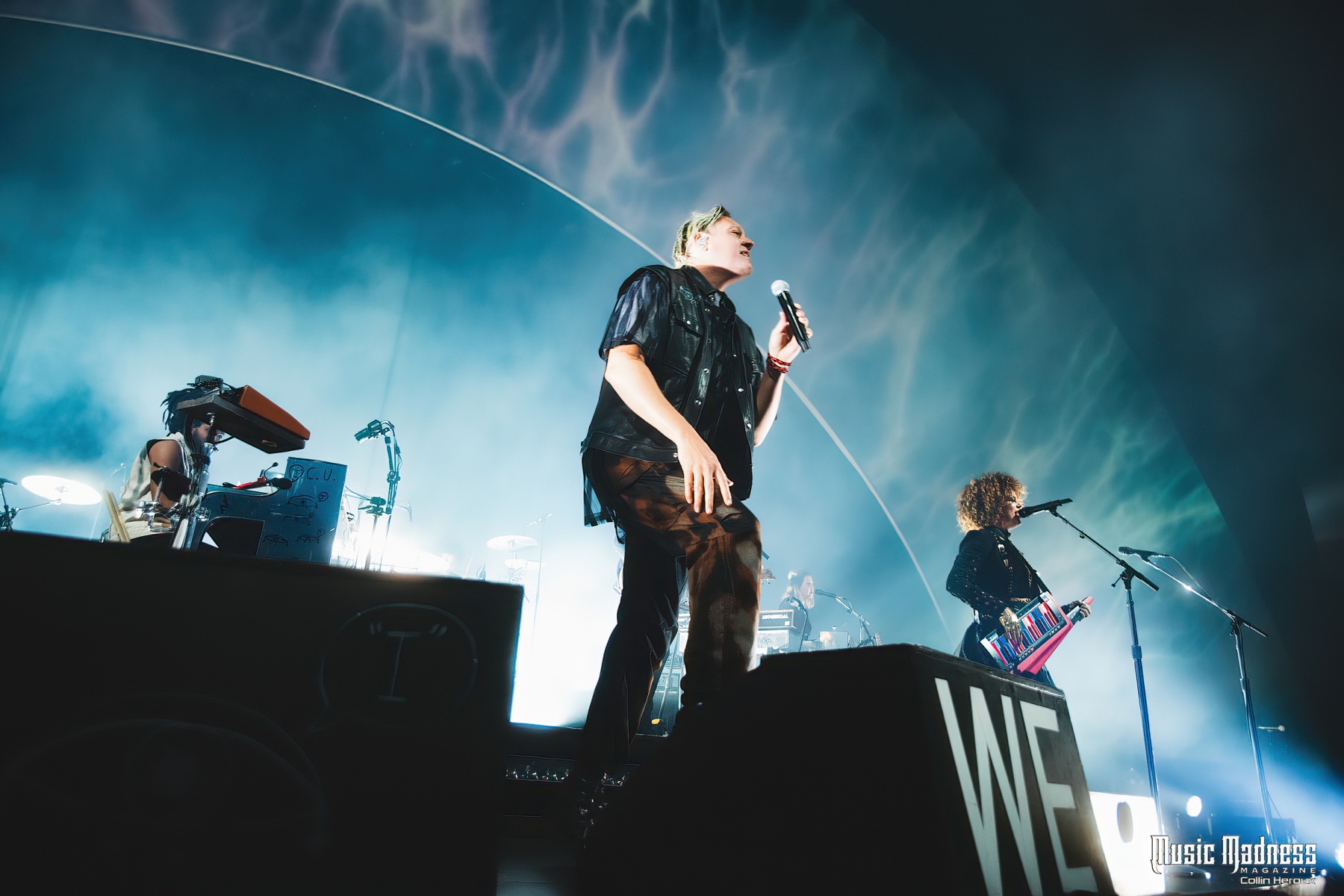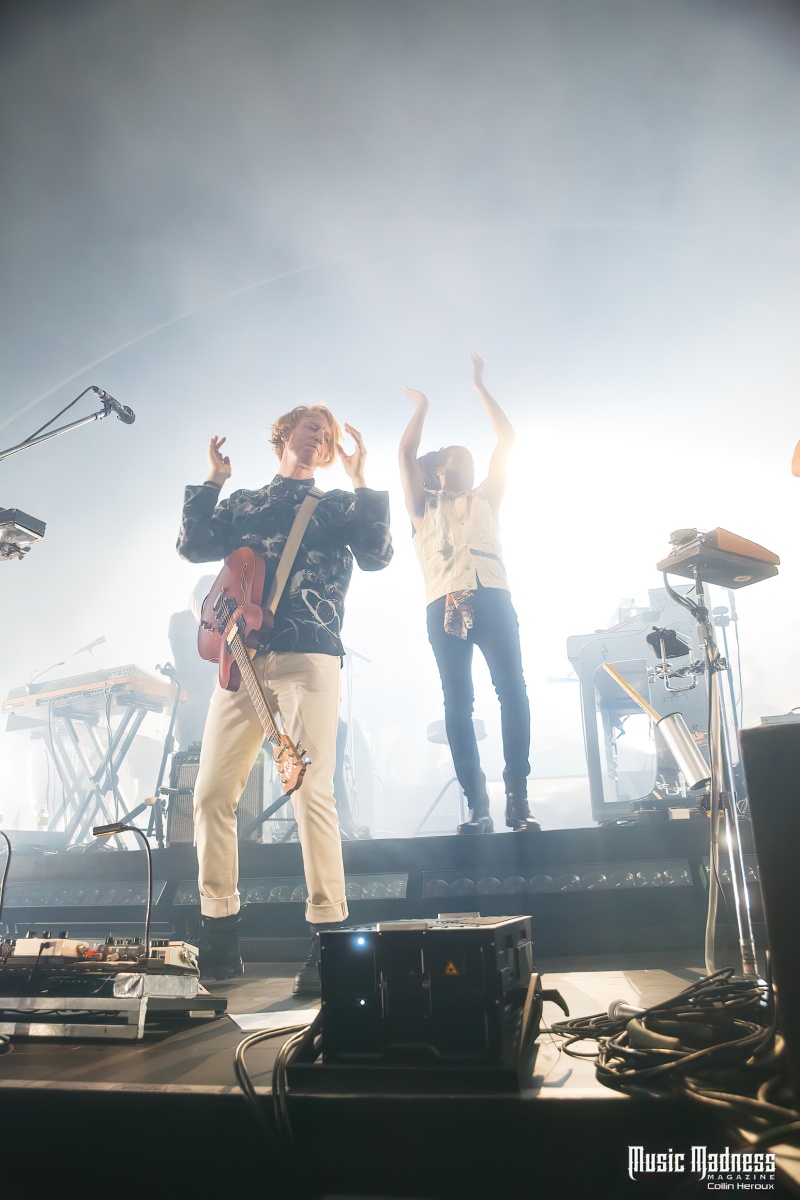
The early 2000s were an incredibly fertile time for music, and a host of bands that sprang up in that era became household names – Arcade Fire prominent among them. The traveling troupe from Canada, known for filling stages with huge numbers of musicians, hit their stride, especially in 2010; a year that saw a particularly-strong slate of releases including albums like High Violet, This Is Happening, and AF’s own The Suburbs. All these and more have come to adorn prominent places in collections for an entire generation of listeners, and Arcade Fire’s latest, WE, finds them in top form, examining relationships at all scales in the context of the current sociopolitical climate in multi-part suites that make up the bulk of the album, tied together by the core couplet of singer and guitarist Win Butler and his partner, multi-instrumentalist Régine Chassagne.
The setup for the show occupies the entirety of Mohegan Sun Arena’s stage, enough real estate for the 8 or 9 members of the band up there at any given moment – including longtime member Richard Reed Parry on a vast array of instruments, as well as Dan Boeckner of Wolf Parade on keys and guitar. They’re all situated underneath a huge half-circle structure resembling an ampitheatre, creating a definitive sense of space, enough to inspire most people to opt for landscape mode when taking videos from the crowd. Closer up, one can see that there are stencils on the front of Butler’s monitors: to his left is one emblazoned with “WE”, and to the right a drawing of a human eye with a speech bubble containing solely “I”. The ‘Age of Anxiety’ – a concept as well as the title of the song which opens both the new album and the show – exists between those two antipodes. Their first album, Funeral, was a dispatch from the throes of youth, but since Neon Bible the band have been fascinated by how people see each other: in the eyes of others, through the lenses of technology, and anything else that may provide a mirror – accurate or not – to our souls.
The night oscillates chiefly between material from WE and The Suburbs, the second and third songs of the night pulled from the latter. ‘Ready to Start’ outlines a somewhat different kind of anxiety, a band on the cusp of huge success trying to navigate the landscape of everything about the music business that isn’t, well… music. Capitalism looms large in ‘Modern Man’, too, and Butler says he wants to smash the mirror that shows him the version of himself in that context, a deliberate reference that presaged them naming their next record Reflektor, the title track of which follows soon enough. Chassagne wears a shining technicolor coat here, one of several outfit changes she undergoes throughout the night, she and Butler standing at the forefront of the stage as 80s-era arrays of blue and green light beam out towards the ceiling. The song is one of a few in the band’s work that spans dual languages – French is spoken not only in Chassagne’s native Montreal but also in Haïti, from where her family immigrated to Canada. Haïtian band Boukman Eksperyans has opened each show of this leg of the band’s tour and during a break between songs Butler thanks the crowd and reveals that some of the proceeds from each show go to charities working in Haïti.
In the center of the room is a secondary stage, conspicuously containing a grand piano with a see-through lid. During ‘Afterlife’ Butler descends from the stage and walks through the audience, circling up to the smaller platform, and climbs atop the tempered glass panel to sing much of the song. “Can we work it out?” goes the refrain, a tale of a relationship framed by a much older narrative of Orpheus and Eurydice, the Greek figures whose sculptures adorn Reflektor’s album cover. A similar push and pull exists in the two-part ‘The Lightning’, whose first movement centers on Butler and Chassagne singing together, “We can make it if you / don’t quit on me / I won’t quit on you”. Analogies to their partnership have always formed part of an Arcade Fire record, the bond harrowed and tested by the large-scale forces that surround them, and this need for interdependence and reliance extends from the personal to the political as well. The second part arrives and no less than six voices onstage sing the chorus, Boeckner switches from acoustic to electric, and it forms WE’s single-best passage, that “We” situated at the center of the lightning storm of swirling turmoil, hope, and uncertainty. Another two-part is just ahead, with the band combining both versions of ‘The Suburbs’, which started and finished the album of the same name. The final moments are particularly forlorn, with Butler alone and reflecting with a kind of bittersweet fatalism.
This leads into the most thoroughly loud moment of the night, ‘Month of May’, where Parry sings backing vocals into an upturned megaphone and he and Butler find themselves jumping up from the stage, guitars in hand, without skipping a beat. The rest of the main set follows this uptempo swing, starting with an audience sing-along in ‘Lookout Kid’ that concludes with a phalanx of inflatable tube-men springing forth from the front of the stage, each one having one of its eyes covered by a cutout of the I-eye symbol from earlier. It’s Chassagne’s turn on the b-stage during ‘Sprawl II’, an apocalyptic vision of late capitalism where landscapes are actually nothing more than “dead shopping malls” stacked on top of each other across the horizon. She sings, on top of the piano as well, “I need the darkness, someone please cut the lights”. The symbolism of light has appeared in every Arcade Fire record, from ‘Power Out’ on Funeral through to ‘The Lightning’ – earliest it was the lighting of a candle when more modern conventions failed; then it became the oppressive fluorescent glow of capital; and most recently the blinding uncertainty of the future.
Butler takes up a bass guitar for ‘Everything Now’, the title track of a record that saw the band bring on Thomas Bangalter of Daft Punk to produce a supremely dance-focused record after dipping their toe into that water with James Murphy on Reflektor. The result is a track that’s very much a love letter to bands like ABBA, and Butler’s change in instrument is just another in an endless series throughout the night across all band members, going to prove how Arcade Fire truly embodies the concept of “total football” in the form of a band, each member able to pick up anything at a moment’s notice. The main set closes with one of the finest songs the band has ever penned, ‘Rebellion (Lies)’. The penultimate piece of Funeral, it’s Butler declaring a childlike intent to fight even against sleep as a means of rejecting the artifice of the world, which even in 2004 pitched towards him with uncomfortable clarity. The song’s scale has only grown in its 18-year lifespan, as tends to happen, and the entire arena unites in its wordless crescendo and echoed refrain. Percussionist Paul Beaubrun carries around a djembe which he plays at the front of the stage, creating the stirring beat that underpins the song’s call to action.
The entirety of the encore lives in the round, as every member of the band squeezes onto the second stage, surrounding Butler in the center. There’s one final suite for the night, the four-part ‘End of the Empire’, which depicts exactly what it says on the tin: people sitting around, coasts of the nation disappearing, oxygen scarce, not much to do but a final dance and drink, worst fears no longer able to be ignored. But even in this moment of despair lives that spirit of defiance, Butler rejecting that outlook by once again drawing strength from a partnership, even if less time than ever remains to act. It’s simultaneously an indictment of the course of this empire, and a testament to the enduring nature of the band’s music, that ‘Wake Up’ still closes the night as powerfully as it did almost twenty years ago when the song was released. Back then we lived, however old or young, in the shadow of perpetual war and military overreach; now we live in a bit less of that, but with a clearer picture of how prospects for recent generations have narrowed in the interim, the very planet slipping into the ocean beneath our feet. But as has ever been true, complacency in the face of a world full of nothing, of plastic souls – is no option at all.
Review and photos by Collin Heroux

